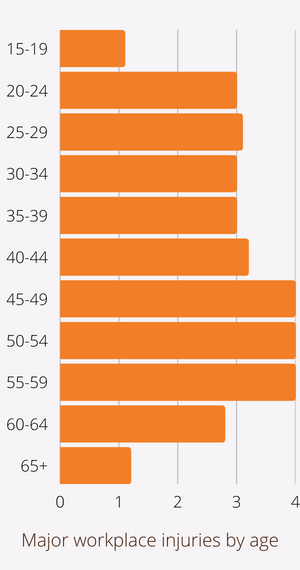Common Law Claims for Work Injury Damages: Your Guide to Compensation

In NSW, if you (the injured worker) have suffered a work-related injury, whether it be physical or psychological, you may be entitled to workers compensation benefits including weekly payments, medical, hospital and rehabilitation expenses and returning to work assistance.
If your injury resulted from your employers negligence, then you may be also be eligible for a lump sum payout through a work injury damages claim, also known as a common law claim.
What Is a Common Law Claim for Work Injury Damages?
A work injury damages claim is also known as a common law claim. It is a lump sum payout for damages if your work-related injury resulted from your employer’s negligence. This injury could be a psychological injury or a physical injury sustained while at work or, in some circumstances, a motor accident in the course of your employment.
In NSW, work injury damages are limited to a claim for past and future loss of earnings calculated until retirement age inclusive of superannuation. You cannot claim for pain and suffering or medical expenses. The claim for past economic loss is adjusted to take into account the amount weekly payments made by the insurer and any Centrelink payments or income protection payments received by you will be repayable from the settlement of the claim.
Upon resolving your work injury damages claim all benefits including weekly payments and medical, hospital, and rehabilitation expenses associated with your injury cease. We recommend you speak to our work injury damages lawyer for a free consultation so you know the benefits and implications of a work injury damages claim.
- Injuries must be determined at 15% whole person impairment or greater
- Injuries must have occurred as a result of your employers’ negligence

Can I Make a Common Law Claim for a Psychological Injury?
You can make a common law claim for a psychological injury if your condition was caused by your employer’s negligence and has been assessed as at least 15% Whole Person Impairment (WPI). Psychological injuries such as anxiety disorders, depression, or post-traumatic stress disorder (PTSD) must be directly connected to workplace negligence and backed by a formal medical diagnosis to make a common law claim.
To make a common law claim for psychological injury, meeting eligibility criteria and providing strong supporting evidence are essential.
Click here to read more about successful common law claims for psychological injury.
Can I Claim a Work Injury Damages Lump Sum?
Yes, you may be eligible to claim a work injury damages lump sum if your workplace injury resulted from your employer’s negligence. To qualify, your injury must meet the following criteria:
- Your work injury resulted from your employer’s negligence.
- Your work related injury has been assessed as being at least 15% whole person impairment (WPI), and this assessment has been accepted by the insurer or determined by the Workers Compensation Commission.
- You have received all statutory lump sum entitlements for permanent impairment to which you are entitled.
- The work injury damages claim is to be made within three (3) years of the date of the injury.

Generally, to prove negligence (point 1 above), you need to establish:
- Your employer owed you a duty of care; and
- Your employer failed to exercise that duty of care; and
- Your permanent impairment resulted from your employer’s negligence.
If you think you may be entitled to make a work injury damages claim, it is recommended that you seek legal advice to assess your eligibility, prospects and circumstances in respect of a claim.
How Is A Work Injury Damages Claim Calculated?
In Australia, a work injury damages claim is calculated based on the economic losses an injured worker has suffered due to their employer’s negligence. Unlike other forms of compensation, this claim only covers past and future lost income and superannuation contributions. It does not include non-economic losses like pain and suffering. Here’s a breakdown of how these claims are calculated:
1. Past Economic Loss
-
Lost income: Wages or salary the worker would have earned from the injury date to the settlement date.
-
Superannuation: Lost super contributions on the income they would have earned.
2. Future Economic Loss
-
Assessment of future earning capacity: Considering the worker’s age, pre-injury earning capacity, and time left until retirement.
-
Adjustments: For likely promotions, inflation, and expected wage increases.
-
Deductions: For residual earning capacity if the worker can still perform some work.
3. Loss of Superannuation
- Calculated as a percentage of the lost income, reflecting what the worker would have accumulated if they had continued working.
It’s important to note that a work injury damages settlement forfeits all further entitlements to workers compensation benefits, including weekly payments, and medical, hospital, and rehabilitation expenses associated with that injury. Given the complexity of these calculations, we always recommend seeking legal advice from a qualified work injury damages lawyer to ensure your case is properly assessed and calculated. Our experienced team of worker injury damages lawyers is ready to assist you with your claim. Contact us for a free claim assessment today.
How Can I Claim Work Injury Damages?
There are various procedural steps involved to bring a claim for work injury damages in NSW.
Firstly, your work related injury must meet the threshold of at least 15% whole person impairment, and that WPI must be accepted by the insurer.
To make a common law claim for work injury damages in NSW, you are required to then provide the employer and their insurer with relevant details of the claim, sufficient to enable the insurer to make an assessment of your full entitlement on the claim. The details you will need are:
- When the injury happened.
- Details of your injury and impairment.
- Details of any previous injury, or any pre-existing condition or abnormality.
- Details of any previous injury claims.
- Details of the economic loss you suffered, that you are claiming as damages.
- Details of the alleged negligence of your employer.
- The amount you’re claiming and any supporting documentation and information.
If the insurer then accepts liability, they will make an offer of settlement. If you do not agree with their offer of settlement, then you may start the process to commence proceedings which involves serving on the insurer a document known as a Pre Filing Statement (‘PFS’). A PFS sets out details of your claim and the evidence you will rely on to establish or support your claim against your employer.
The Defendant (the insurer/employer) will then have 28 days to serve a Pre-Filing Defence (‘PFD’) setting out their determination as to liability, and their response and evidence that they will rely upon. Should they fail to reply within 28 days, you can seek mediation in the Personal Injury Commission to try to settle the matter without the need to go to court.
At mediation, the parties will meet in an attempt to exchange offers of settlement however, if the parties are unable to reach an agreement, the claim will be heard in the District Court.
If you’re negotiating work injury damages with an insurer, or considering commencing a work injury damages claim, it’s strongly advised that you get independent legal advice on your options and consider having one of our personal injury lawyers negotiate settlement, or represent you in court, on your behalf.
Do You Need to Go to Court for Work Injury Damages?
The parties will have opportunities to resolve the matter before starting mediation or court proceedings. A mediator will assist the parties to reach a settlement through discussions however, not all matters resolve at this stage. If you don’t agree with an insurer’s offer of settlement, and an agreement cannot be reached regarding your lump sum payment, then you will need to commence proceedings for work injury damages in court.
It is important to note that you can only start court proceedings from at least six (6) months after the injury was reported to the employer.
There are also time limits which apply, whereby you must commence court proceedings within three (3) years of the work injury. Our work injury damages lawyers will advise you of what is in your best interests and how to claim maximum compensation for your work injury.

What Are the Time Limits for Work Injury Damages Claims?
The time limit to lodge a work injury damages claim is three (3) years from the date of the injury however, special leave (permission) for an extension of time may be granted by the Court in specific circumstances. To obtain an extension of time, you will need to make an application to the Court seeking their leave to commence proceedings outside of the prescribed time. Of course our lawyers will do this on your behalf if we were acting for you.
How Long Does a Common Law Claim Take?
One of the most common questions we hear is: “How long does a common law claim take?” The answer depends on various factors, but on average, a common law claim takes around 1.5 to 2 years to resolve.
If your injuries are severe and require multiple surgeries, your claim may take longer than 2 years however. This is because your medical condition must reach maximum medical improvement before a permanent impairment assessment can be made.
Each case is unique, and the timeline can vary based on the complexity of the claim and the negotiation process. Our work injury damages lawyers can provide a more accurate estimate after reviewing your situation. Contact us today for a free claim assessment so you can get a better understanding of the expected time frame for your common law claim.
How Much Do Lawyers Charge for a Common Law Claim?
Before starting a work injury damages claim, you should seek independent legal advice.
For work injury damages claims in NSW, legal costs will be payable as the Independent Review Office does not fund these claims.
How much a solicitor can charge you for representing you in a work injury damages claim are included in the Workers Compensation Regulation 2016. However, in most cases, law firms including this one ask that you enter into a separate costs agreement through which we are entitled to charge more than the regulated costs under the Regulation. However, we ensure our legal costs are reasonable and proportionate to your settlement and we only charge you for the work we did. We will never settle a claim without keeping you in the loop and of course on your instructions.
For these claims we work on a ‘no win no fee’ basis. That means that your legal costs and disbursements will only be payable if your claim is successful. We will provide you with a Costs Agreement and Disclosure that outlines our legal costs and disbursements to act on your behalf.
What Happens After My Work Injury Damages Claim Resolves?
Upon resolving your work injury damages claim all benefits including weekly payments and medical, hospital, and rehabilitation expenses associated with your injury cease.
You will be paid a lump sum for the agreed past and future economic loss. In some cases, your employer may seek that you resign from employment if you are still employed. Whilst claiming a lump sum payout may be appealable and preferential to most people it is not always the case as depending on your whole person impairment it could be more worthwhile to stay in receipt of benefits. Our work injury damages lawyers will guide you and advise you on the best possible solution based on your specific circumstances once we have spoken and obtained relevant information.
Which Industries in Australia Have the Most Serious Work Injury Damages?
Health care/social assistance and construction industries account for the highest number of serious work injuries. Manufacturing, transportation, and retail industries follow these two industries in terms of the total number. When it comes to incident rate, agriculture, fishing, and forestry are the most dangerous industries per worker.

What Are the Most Common Injuries Eligible for a Common Law Claim?
In order to lodge a common law claim, your injuries must be assessed as a minimum of 15% whole person impairment. The most common serious injuries in Australia eligible for a common law claim are traumatic joint and amputation injuries, including but not limited to shoulder, knee, hip, elbow, back, foot, and finger injuries.
Get a Free Claim Check for Your Common Law Claim
Our experienced personal injury lawyers have helped thousands of people in NSW secure compensation through common law claims and work injury damages. Contact us today for a free claim check and let us help you get the compensation you deserve!

Issa Rabaya
• Bachelor of Laws
• Graduate Diploma in Legal Practice
• Approved Legal Service Provider to the Independent Review Office
• Member of the Law Society

Issa Rabaya
• Bachelor of Laws
• Graduate Diploma in Legal Practice
• Approved Legal Service Provider to the Independent Review Office
• Member of the Law Society
Free Initial Consultation

Related blogs

Can I retire while on workers compensation?
What happens to my workers’ compensation when I retire? If you have been receiving weekly payments through your workers’ compensation claim and you have reached

Can Your Workers Compensation Claim Be Denied?
If you have been injured in the course of employment you are entitled to workers compensation entitlements which include but are not limited to wages,

Workers Compensation and Exempt Workers
Exempt workers are certain classes of workers who are not covered by the most of the provisions of the workers compensation acts in New South

Workers Compensation Weekly Benefits in NSW
Employers have a responsibility to fulfil their occupational health and safety obligations. This responsibility ensures that you receive entitlements if you are injured while working


